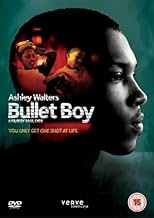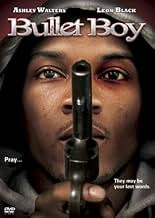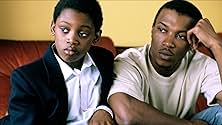IMDb रेटिंग
6.5/10
2.9 हज़ार
आपकी रेटिंग
अपनी भाषा में प्लॉट जोड़ेंTwo troubled, street-smart boys, Ricky and Curtis, who struggle to navigate a volatile neighborhood. They face challenges in friendships, family and loyalty, as guns become a reality and boy... सभी पढ़ेंTwo troubled, street-smart boys, Ricky and Curtis, who struggle to navigate a volatile neighborhood. They face challenges in friendships, family and loyalty, as guns become a reality and boys try to be men before they're teenagers.Two troubled, street-smart boys, Ricky and Curtis, who struggle to navigate a volatile neighborhood. They face challenges in friendships, family and loyalty, as guns become a reality and boys try to be men before they're teenagers.
- पुरस्कार
- 3 जीत और कुल 3 नामांकन
Clare Perkins
- Beverley
- (as Claire Perkins)
Sharea Samuels
- Shea
- (as Sharea-mounira Samuels)
Jaime Winstone
- Natalie
- (as Jamie Winstone)
फ़ीचर्ड समीक्षाएं
This was a great film. I have been watching a lot of urban type UK films lately and this one is by far my favorite so far. The Uk ghettos are very similar to Canada where I live. When people think of Canada and the UK they don't seem to think there are any ghettos. Where I live in Toronto, Ontario, we are influenced by the States a bit but much more by the sizable Jamaican presence in the area. The film did a good job at depicting how such small issues can grow into something very big and life changing. Ashley Waters is very talented. His performance was very believable.
So far I've seen "Rolling with the Nines"(Sucked), "Kidulthood"(Very good), "Life & Lyrics"(Not too bad, but kinda corny). Does anyone know of any other good movies of this same type to suggest? Peace
So far I've seen "Rolling with the Nines"(Sucked), "Kidulthood"(Very good), "Life & Lyrics"(Not too bad, but kinda corny). Does anyone know of any other good movies of this same type to suggest? Peace
This film was painful to sit through. Went to the screening at the London film festival and couldn't believe the stereo typical representations with dialogue so bad (it made me cringe) I couldn't understand how the film council can spend tax payers money on something so pointless.
I went with two black friends of mine to see the film. For a film that's supposed to be of serious nature they laughed all the way through it as if it was a comedy. I assumed I wasn't getting the jokes but later found out they were laughing at it rather than with it.
It was obvious that the executives at film council have none or very little knowledge about the black community in London. I've worked with many black children/ youth and I couldn't recognise many of the characters that appeared on the film.
I wasn't surprised to find out that the producers of this very awful film are actually executives at the film council. NO WONDER. This isn't a film I recommend even when it's on TV.
I went with two black friends of mine to see the film. For a film that's supposed to be of serious nature they laughed all the way through it as if it was a comedy. I assumed I wasn't getting the jokes but later found out they were laughing at it rather than with it.
It was obvious that the executives at film council have none or very little knowledge about the black community in London. I've worked with many black children/ youth and I couldn't recognise many of the characters that appeared on the film.
I wasn't surprised to find out that the producers of this very awful film are actually executives at the film council. NO WONDER. This isn't a film I recommend even when it's on TV.
Back in 1980, Franco Rosso's Babylon, starring Aswad's Brinsley Forde, told the story of young black Britain under siege. Filmed around Deptford, Lewisham and Brixton in south London and financed by the National Film Council, it drew a fundamentally honest, unsentimental portrait, employing a rich, unsubtitled patois. Understandably, much of the film also dealt with racism - white on black - and its tragic repercussions.
Twenty-five years on, the most significant (and depressing) thing about Saul Dibb's study of black Londoners is its frank recognition that the hate and violence has since turned inward - manifested in gun crime.
In Bullet Boy, 20-year-old Ricky (Walters, aka So Solid Crew's Asher D) is paroled from youth custody and attempts to rekindle a relationship with his girlfriend Shea (Samuels). Hooking up with his hot-headed friend - the ironically named Wisdom (Black) - he almost immediately runs into trouble with rival Godfrey (Lawson) in a road rage incident. As the tit-for-tat feud escalates, Ricky's impressionable 12-year-old brother Curtis (Fraser) discovers a gun which Wisdom has given Ricky for his protection - and the murderous cycle of violence continues.
This is a film of firsts. Arriving some 15 years after a brace of similarly-themed American films, such as John Singleton's Boyz N The Hood, this is the first film to spotlight gun violence in Britain's black community, and makes an interesting comparison. It's documentary maker Dibb's first feature too, having previously made 'Electric Avenue' and 'The Tottenham Ayatollah' for Channel 4 television. And it's Asher's (okay, Walters') movie debut.
It's a cute - and astute - stroke of casting: he'd read the script while in prison for gun possession. And the cast is one of the things Bullet Boy has got right, featuring gutsy and unsentimental performances, particularly from the all too convincing lead, but also from stand-up comedian Curtis Walker as a former bad-boy-turned-pastor and Perkins as a pragmatic matriarch.
The use of non-professional actors also imbues proceedings with documentary-style naturalism, matched by the film's east London locations, photographed by Marcel Zyskind in pitiless natural light, and employed very effectively during a recurring motif of a dead dog floating on a river like the ghost at the feast.
Though Dibb cannot hope to encompass the whole subject matter in a 90-minute film, his focus on how gun culture affects the entire family unit is an intelligent approach, making the wider issue accessible - and subsequently harder hitting.
If certain sequences appear heavy-handed - 12-year-old Curtis playing shoot-em-up videogames as a prescient prelude to tragedy; the Godfather-style juxtaposition between a church sermon and a murder - well, perhaps that's the way it ought to be.
Twenty-five years on, the most significant (and depressing) thing about Saul Dibb's study of black Londoners is its frank recognition that the hate and violence has since turned inward - manifested in gun crime.
In Bullet Boy, 20-year-old Ricky (Walters, aka So Solid Crew's Asher D) is paroled from youth custody and attempts to rekindle a relationship with his girlfriend Shea (Samuels). Hooking up with his hot-headed friend - the ironically named Wisdom (Black) - he almost immediately runs into trouble with rival Godfrey (Lawson) in a road rage incident. As the tit-for-tat feud escalates, Ricky's impressionable 12-year-old brother Curtis (Fraser) discovers a gun which Wisdom has given Ricky for his protection - and the murderous cycle of violence continues.
This is a film of firsts. Arriving some 15 years after a brace of similarly-themed American films, such as John Singleton's Boyz N The Hood, this is the first film to spotlight gun violence in Britain's black community, and makes an interesting comparison. It's documentary maker Dibb's first feature too, having previously made 'Electric Avenue' and 'The Tottenham Ayatollah' for Channel 4 television. And it's Asher's (okay, Walters') movie debut.
It's a cute - and astute - stroke of casting: he'd read the script while in prison for gun possession. And the cast is one of the things Bullet Boy has got right, featuring gutsy and unsentimental performances, particularly from the all too convincing lead, but also from stand-up comedian Curtis Walker as a former bad-boy-turned-pastor and Perkins as a pragmatic matriarch.
The use of non-professional actors also imbues proceedings with documentary-style naturalism, matched by the film's east London locations, photographed by Marcel Zyskind in pitiless natural light, and employed very effectively during a recurring motif of a dead dog floating on a river like the ghost at the feast.
Though Dibb cannot hope to encompass the whole subject matter in a 90-minute film, his focus on how gun culture affects the entire family unit is an intelligent approach, making the wider issue accessible - and subsequently harder hitting.
If certain sequences appear heavy-handed - 12-year-old Curtis playing shoot-em-up videogames as a prescient prelude to tragedy; the Godfather-style juxtaposition between a church sermon and a murder - well, perhaps that's the way it ought to be.
I would like to start off saying that I appreciated the movie for dealing with the black community in London. No rude cockney gangsters, catchy crime scams or laughably stupid dope dealers. The family this movie deals with is a single mum home with two sons, one just out of prison, the other still too young to be involved in anything hazardous, but looking up at his brother and already copying some of his ways.
I enjoyed the language and the characters who were all convincing and complex enough but, how carefully put down they were, the more obvious and stereotypical were the things happening to them. Everything going from bad to worse, who plays with fire is gonna get burnt. And then the ultimate contrast of either sinking into crime and sin (devil), or choosing the righteous path and go to church every Sunday (god).
This easy moralism hurt the rest of the film. It made things predictable. It was like a newspaper article collage, one shock after the other. It took away much of the complexity that I found in the characters themselves. It really is a shame because the development of the characters could have been much more subtle and would have fit in better with the style of the movie that deals with a gritty context matter but managed to use a soft and sometimes almost dreamy camera and score, not unlike other recent British films, such a 'Morvern Callar' and '16 Years of alcohol'.
I enjoyed the language and the characters who were all convincing and complex enough but, how carefully put down they were, the more obvious and stereotypical were the things happening to them. Everything going from bad to worse, who plays with fire is gonna get burnt. And then the ultimate contrast of either sinking into crime and sin (devil), or choosing the righteous path and go to church every Sunday (god).
This easy moralism hurt the rest of the film. It made things predictable. It was like a newspaper article collage, one shock after the other. It took away much of the complexity that I found in the characters themselves. It really is a shame because the development of the characters could have been much more subtle and would have fit in better with the style of the movie that deals with a gritty context matter but managed to use a soft and sometimes almost dreamy camera and score, not unlike other recent British films, such a 'Morvern Callar' and '16 Years of alcohol'.
I wasn't expecting too much of this film before I saw it, but I have to say I was wrong to think it would be dull. Although American audiences -- and, in fact, non-London-dwelling audiences -- probably won't appreciate it for its wonderful depiction of east London, I find myself for once thankful that I live in Hackney. Some scenes around the Hackney Marshes and Lea Valley are astonishingly lush, to the extent that I had my doubts they were actually filmed there, because they present such a contrast to the grubby streets I'm used to, and which are portrayed in other parts of the film.
One of the other things that struck me was the accuracy of the dialogue -- I know this sounds a bit silly, but it's easy to get wrong, and in Bullet Boy there wasn't a word out of place. Lines like "that dog's like my brethren" are faintly amusing, but people do actually speak like that, and Bullet Boy got it exactly right.
I think Bullet Boy is a beautiful film, and have in fact only one gripe besides perhaps its inaccessibility for people who aren't English: the editing-over of a sign at a train station from the station name to 'Platform 2'. I'm an appalling pedant.
One of the other things that struck me was the accuracy of the dialogue -- I know this sounds a bit silly, but it's easy to get wrong, and in Bullet Boy there wasn't a word out of place. Lines like "that dog's like my brethren" are faintly amusing, but people do actually speak like that, and Bullet Boy got it exactly right.
I think Bullet Boy is a beautiful film, and have in fact only one gripe besides perhaps its inaccessibility for people who aren't English: the editing-over of a sign at a train station from the station name to 'Platform 2'. I'm an appalling pedant.
क्या आपको पता है
- ट्रिवियाShot largely within one square mile on the edge of Hackney.
- गूफ़When Rio and Leon are playing hide and seek, the boom microphone is visible in the lower left corner screen for a second.
- कनेक्शनFeatured in Louis Theroux Interviews...: Ashley Walters (2023)
टॉप पसंद
रेटिंग देने के लिए साइन-इन करें और वैयक्तिकृत सुझावों के लिए वॉचलिस्ट करें
- How long is Bullet Boy?Alexa द्वारा संचालित
विवरण
बॉक्स ऑफ़िस
- बजट
- £10,00,000(अनुमानित)
- दुनिया भर में सकल
- $5,72,990
- चलने की अवधि1 घंटा 29 मिनट
- रंग
- ध्वनि मिश्रण
- पक्ष अनुपात
- 2.35 : 1
इस पेज में योगदान दें
किसी बदलाव का सुझाव दें या अनुपलब्ध कॉन्टेंट जोड़ें

























